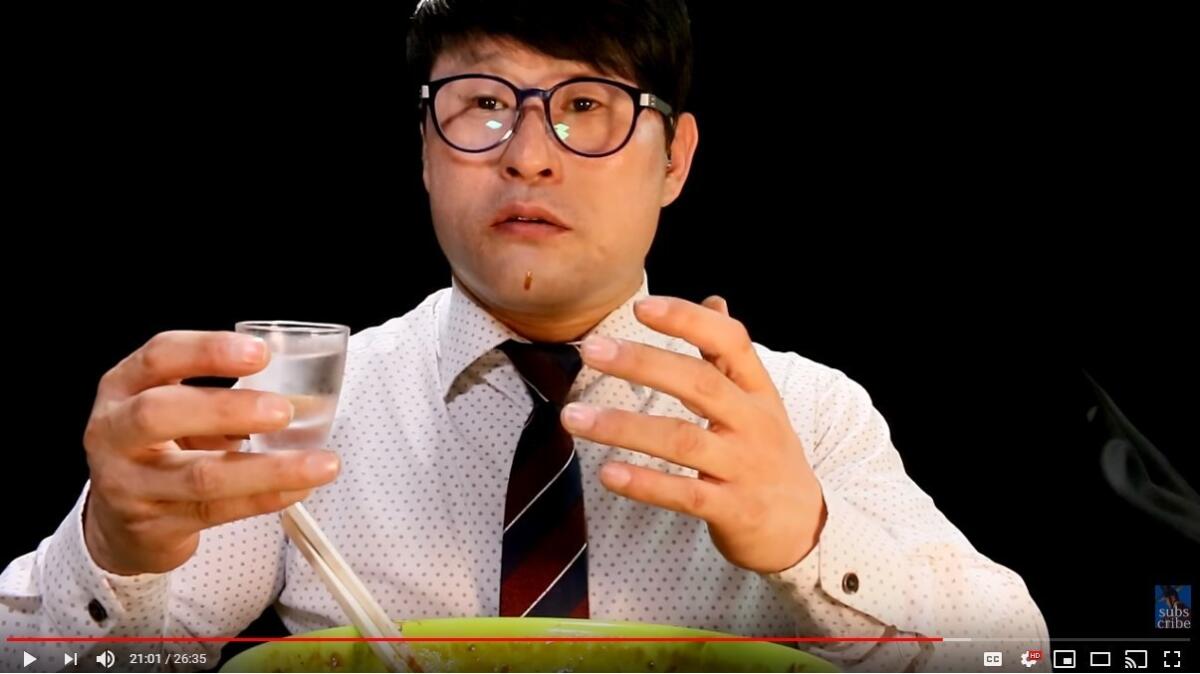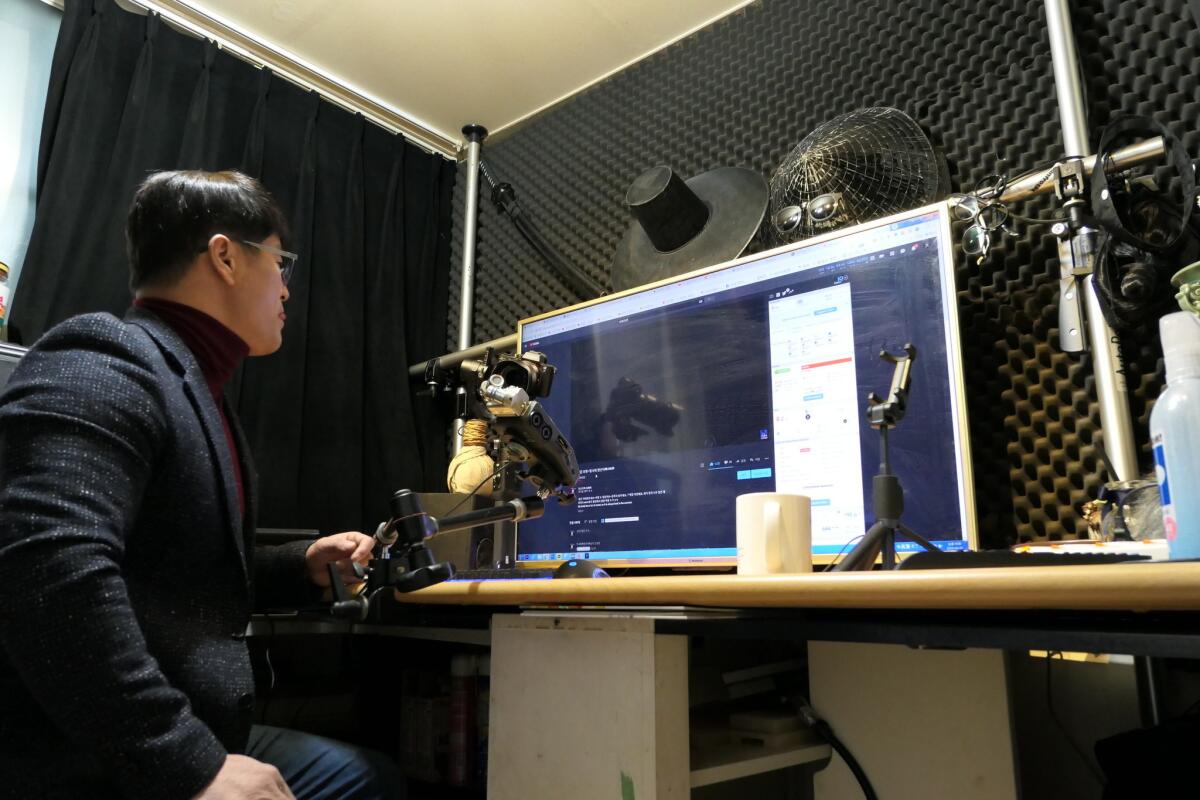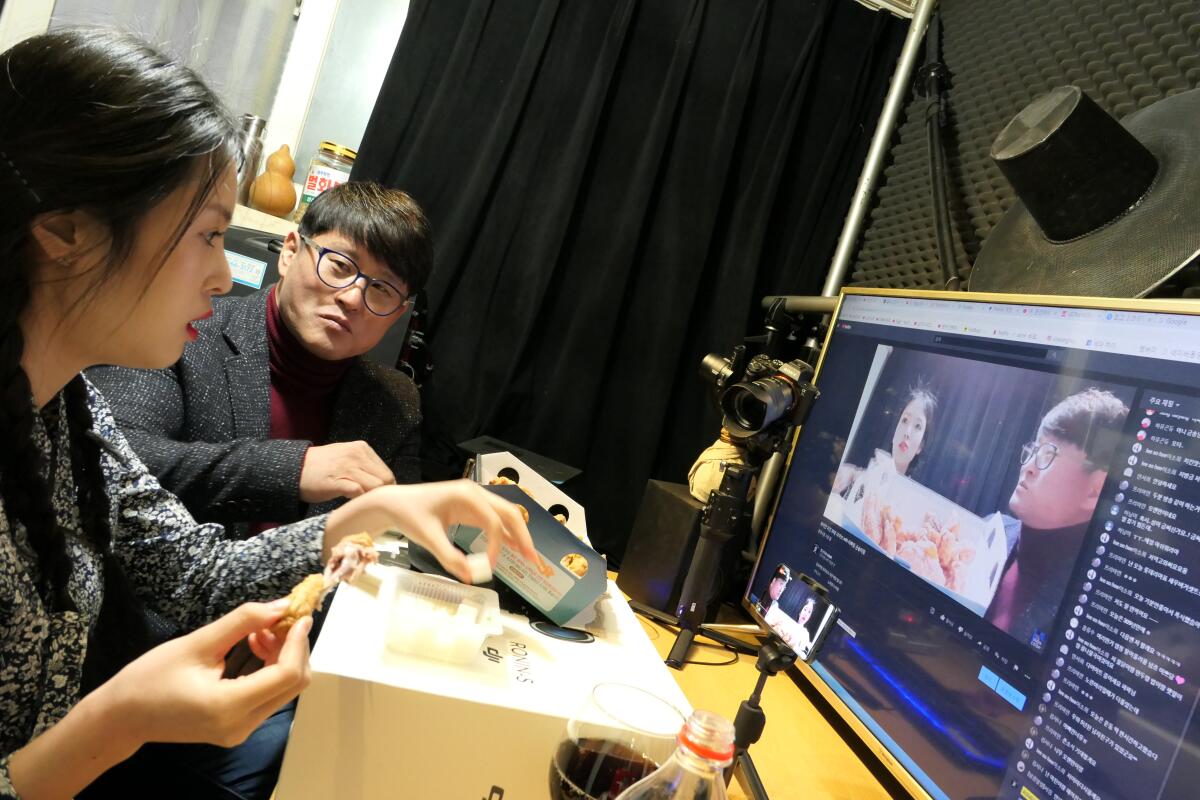In need of fatherly advice? In South Korea, there’s a YouTube channel for that

- Share via
SEOUL — When Mun Jung-ho launched his YouTube career a couple of years ago at the ripe age of 50, he wasn’t sure what he wanted his channel to be about.
Mun, a voice actor by day, experimented with various trends popular in South Korea. He recorded video reviews of camping and outdoor gear. He tried mukbang, close-up videos of himself eating, a years-long craze that gives viewers the illusion they aren’t dining alone. He dabbled in autonomous sensory meridian response (ASMR), the tingle-inducing heightened-sound videos that were fast becoming all the rage.
Then a few weeks in, a viewer commented on one of his videos: You remind me of my dad.
Mun took the comment to heart and began playing the role of a “YouTube Dad” talking directly into the camera, accompanied by soothing ASMR sounds. Sometimes, he was a father eating Chinese delivery with his son after work. A dad gently combing and braiding his daughter’s hair. A father polishing a pair of well-worn shoes while soliloquizing about his children.
In each video, he played the part of the father he wished he’d had growing up and the one he struggled to be for his own son: a warm, expressive, supportive dad, a rarity in South Korea’s patriarchal society, where fathers are expected to be solemn and authoritative.
“You’re doing well, you’ll be great. Dad believes in you,” he’d say into the camera. “Do what you want to with your life, or you’ll regret it.”
It seemed to strike a chord. Many of his more than 53,000 subscribers have taken to calling him appa — “Dad” in Korean. In the comments section, they’ll tell him about their day, fret about what’s troubling them and seek his advice on everything from school to jobs to life.
Many fall asleep to the comforting sound of his voice. Many confide in him, a stranger they know only through their smartphone screen, telling him some of their deepest, most personal thoughts.
::
He was a strict, looming presence, one I loved but couldn’t dare express it.… Hearing your voice makes me choke up at the thought of my parents.… He struggles with alcohol but says he can’t stop drinking. I remember hiding scared under the blankets whenever he’d come home drunk.
::
Mun is just one YouTube personality offering something many seem to crave in hyper-urban South Korea, where many people live densely packed in high-rises yet are somehow increasingly isolated from one another: a semblance of human connection.
Loneliness is a growing social problem all over the developed world. In South Korea, where more and more young people choose to live alone and traditional family bonds are fraying, three-quarters of adults said in a recent survey that they’d felt lonely in the last month. One in 4 said they frequently or almost always felt lonely. With some of the fastest internet speeds in the world, many people are wedded to their phone screens even in the most crowded of spaces and in the company of their closest family and friends.
Increasingly, South Koreans have been turning to YouTube to fill the silence in their days. The time they spend watching YouTube videos has quadrupled since 2016, making it the app they spend the most time with by far, according to statistics released in November by an industry research group.

On YouTube, South Koreans can tune in to a virtual mom, friend, boyfriend or grandma who will whisper in their ear, lull them to sleep or eat or drink with them as if they are right there.
Mun’s is but a sliver of that market — popular YouTube stars have millions of followers — but he’s amassed a dedicated and loyal subscriber base of those he refers to as his virtual sons and daughters, ranging in age from school-age teens to those in their 30s with their own children.
At first, Mun’s role-playing as a father was mostly a gimmick for his ASMR and eating videos, playing up the fact that he was older than most YouTube stars by a few decades. But as dozens, then hundreds, started leaving increasingly poignant and personal comments in response to his videos, he realized he was becoming a lot more than an online novelty to many of his viewers.
Reading their comments, Mun says he came to realize just how alienated many children feel from their families.
“It was heartbreaking. So many of our kids are really struggling,” he recalled. “It made me realize there isn’t enough conversation in our homes, that communication just isn’t happening.”
He started spending hours personally responding — as himself, not in character — to hundreds of individual comments. He gave out his personal number and email address, talking to many people on the phone or over text messages and offering advice based on things he’s learned the hard way in his tortuous five decades of life.
“I’m a 28-year-old, unemployed as of a week ago,” one viewer wrote. “I came looking for consolation, it was exactly what I needed today:) Thank you!”
In a lengthy response, Mun told her: “There are things that just never work out no matter how hard you try at it. In the end, it all becomes experience and know-how.… Sometimes, it might be best to stop trying to swim upstream and float down along with the current.… Cheer up, it’ll all work out. I believe you’ll be able to work through it all.”
About a year after starting his YouTube channel, he opened up about his own life in a post accompanying one of his videos, telling his viewers how much the YouTube channel had come to mean to him.
“When I was young, my father was an object of fear and dread. I’m sure my father was upset because I was a troublemaker of a son, but that led to violence,” he wrote. “Fathers back then were bad at expressing themselves. Korean fathers even today tend to be stoic.”
Most people his age, Mun wrote, grew up without feeling much love from their parents. He wanted to change that for the next generation, one YouTube video at a time, he wrote.
“My father, who was once terrifying, is now an elderly man in his late 70s with a hunched back and skin and bones.… For all the love I never received, I’m sure there are so many other sons and daughters in this world still hurting. I want to help them heal. I want to be a small Band-Aid on their wounds.”
::
My parents recently divorced, and I haven’t talked to my dad in about two years. My friends talk to their dads on the phone and hang out with them, but I lied and said my dad had to go to work. I miss holding hands with my dad and going to eat tonkatsu with him, but I also hate him for what he did to my mom.… Your video made me realize my dad used to talk to me in the same tone that you did, but I ignored it.… Thank you, I love you ♡
::
In two years of being “YouTube Dad,” Mun has heard it all. People have told him stories of parents cheating on each other, bullying at school, abuse from parents, extreme stress from Korea’s competitive academic environment.
As he tells many of them, he knows firsthand what they’re going through.
Mun grew up on Jeju, an island off the southern coast of the Korean peninsula.
His mother left when he was 7, abandoning him to be raised by relatives until his father later remarried. Mun became a rebellious teen, repeatedly running away from home throughout his youth. He fancied himself a Huck Finn of sorts, living in the woods and subsisting by laying traps for wild animals or spearfishing. Each time he returned home, he’d be met with his father’s wrath and physical blows.

As an adult, after a failed business venture led to a divorce from his first wife, Mun was left a single dad with a 7-year-old son. As he flitted from odd job to odd job, struggling to make rent on the tiny room he shared with his son, he found himself shaping up to become the same strict, angry father he’d resented as a child.
“I realized I had to change,” he recalled. “I can’t change my son by berating him and punishing him. I needed to embrace him with my heart.”
He’d always had a distinct, booming voice that customers often remarked on when he was waiting tables. In his early 40s, he was featured in a television documentary as an aspiring voice actor struggling to escape poverty. That opened doors, and he began working as a professional voice-over narrator on major television networks and home shopping programs.
Slowly, he built a relationship with his son, playing video games with him, learning to listen to him and connect with him as a friend he can talk to about anything. He met a woman and remarried. It finally started feeling like he had a handle on life.
It was then, from his semi-basement apartment in Seoul, that he started posting videos on YouTube as an outlet to supplement his irregular freelance work. He had little idea what it would turn into.
::
My father is very stoic. He’s patriarchal but was always so good to me, and it was apparent how much he treasured me. He smoked, and the smell was always on his clothes and skin.… Sometimes, I avoided him because of the strong stench. Now, he has lung cancer and doesn’t have much time left.… I should have spent more time with him, dissuaded him from smoking. I just avoided him without saying anything because I hated the smell. All that’s left is regret.
::
Kim Hyun-a, a 36-year-old homemaker, counts herself among Mun’s virtual daughters.
Many evenings, she finds herself feeling empty after her husband has left to work his night shift and she’s put her children to bed. She’ll watch YouTube for hours.
She’s subscribed to Mun’s channel for almost two years and has watched some of his videos over and over, more times than she can count. Mun, she says, has a similar smile and warmth as her late father, who passed away more than a decade ago.
“He says what a lot of fathers probably aren’t able to express,” she says. “He’s earnest.”
She’s come to regularly talk to him about her frustrations with parenting and problems at the kids’ schools. She’s organized real-life get-togethers with other fans of the channel and become friendly with others who turn to Mun.
James Jeong, 25, a recent college graduate, says he’s confided in Mun about problems with a friend that he can’t talk to his real-life father about. When Jeong was young, his father was busy running a business and rarely home, and they’ve never had very deep conversations, he says.
“It’s like having a second father,” he says of Mun. “I love him as a dad.”
::
You’re the same age as my dad, and you remind me of him so much. He’s away from home working in manual labor to make money. I’m such an inexpressive daughter that I never showed him how I feel. As I’ve been listening to your ASMR, appa, the idea of a father began feeling a little more approachable and familiar. And today, I tried telling him I loved him for the first time. The thing that was so hard for me to say, I finally said it, after 28 years. I feel moved, proud and warm. Thank you.
::
The channel brings in a modest income of a couple of hundred dollars a month, not enough to cover the cost of the cameras, mics and props he keeps buying for better quality videos. Mun nevertheless posts a few videos a week, on top of occasionally live-streaming to talk directly with his subscribers. He feels obliged to his many online sons and daughters to continue because he can tell how much they rely on it.
His real-life son, now 25, watches his videos and gives him feedback, and has cameoed his voice in the background of some of them.
Mun’s father, now 78, doesn’t have a smartphone and has no idea what YouTube is. Even though he remains gruff and stoic, he has softened with age and beamed about Mun’s TV appearances.
Elsewhere on the internet, Mun says, friends and acquaintances who are his age seem to be preoccupied with bragging about their children, obsessing over their grades and tallying their successes.
He urges them to read the comments on his videos. He feels dismayed at the disconnect he sees between the generations.
In April, he asked his subscribers what they most wished their fathers would tell them. In a video, he gently spoke the words they said they wanted to hear the most.
Thank you for being born.
You’re doing well, you’ll do great.
I’m sorry.
I love you.
More to Read
Sign up for Essential California
The most important California stories and recommendations in your inbox every morning.
You may occasionally receive promotional content from the Los Angeles Times.















